Choosing the right duvet filling is essential for a comfortable sleep experience – it really makes a difference to how cosy you feel. With a range of options available, it can be overwhelming trying to decide between different materials. That means it’s time to wrap up and join us as we focus on two popular duvet fillings: feather and bamboo. Let’s explore the features and benefits of each and compare them to help you make an informed choice. It’s all about what’s right for you.

Feather duvets
Feather duvets are those filled with or crafted from the soft feathers found underneath the exterior feathers of birds, often from geese or ducks. The better quality it is, the higher the fill percentage will be – you should look for duvets with around 85% feather fillings. They are known for their exceptional warmth and natural insulation properties. Feather duvets provide a luxurious and lofty feel, offering the perfect balance of warmth and breathability.
However, they can sometimes be slightly itchy if the feathers poke through the outer cover. This means if you’re someone who is naturally quite itchy or sensitive, feathers might not be right for you. And if you choose to steer clear from any animal-derived products in your bedding and home, this might not be the best option. But you should definitely consider a feather fill if you want something super warm, heavy and snuggly!
Bamboo duvets
Bamboo duvets are made from rayon derived from bamboo fibres, and sometimes, the fill is combined with synthetic fibres to make it even more cosy.
Bamboo is one of the best eco-friendly duvet options, and the material is known for its natural moisture-wicking and temperature-regulating properties. Good quality options will offer softness, breathability, and hypoallergenic benefits, making them suitable for individuals with sensitive skin or allergies.
One downside of bamboo duvets is that they tend to be more costly than other materials, but this reflects the quality, and they’re definitely worth it for how well you’ll sleep… If you’re after luxury and sustainability for your bedroom, however, then you should absolutely consider a bamboo duvet.

Comparing feather and bamboo duvets
When comparing feather and bamboo duvets, several factors come into play – they are two of the current most popular types, so it makes sense to really look into both options and decide which one works for you. Feather duvets excel in warmth and insulation, making them ideal for colder climates or individuals who prefer a cosy sleep environment; cold sleepers love them! On the other hand, bamboo duvets are prized for their breathability and temperature regulation abilities, keeping you cool and comfortable on hot nights but cosy when it gets cold. Here is some more duvet-filling comparison information:
1. Hypoallergenic properties
Bamboo is 100% hypoallergenic and resistant to dust mites, whereas some dust mites and allergens can work their way between the feathers if this is the fill you go for. This makes bamboo the best duvet filling for allergies.
2. Accessibility
Feather duvets have been around for a lot longer than bamboo duvets, so you might find that they’re more widely available to purchase when you’re in the market for a new duvet.
3. Weight
Despite being cosy and comfortable, bamboo duvets are super lightweight – feather duvets, though, are a bit heavier…
4. Caring for your duvet
Both feather and bamboo duvets can be machine washed and should be done so at a lower temperature to ensure they stay in the best condition.
5. Chemicals
A bamboo duvet (like our Bamboo Cloud Duvet) is chemical-free, as there are no chemicals used in the process of creating fabric from bamboo. However, feathers are often sanitised with chemicals before being added to duvets – this can cause issues for some people.
6. Sustainability
Bamboo is a wonder fabric – not only does it have all these incredible properties, like being hypoallergenic and thermoregulating, but it is also one of the world’s most sustainable materials. Feathers, however, come from birds like geese and ducks; animal products are not considered to be sustainable bedding materials.
How to choose between feather and bamboo duvets
When it comes to how to choose the right duvet, it’s worth considering these comparisons. Think about what you want (hypoallergenic duvet choices, a budget-friendly option, etc) and what will work best for you, and weigh up your options. Whichever comes out on top is right for you – there are bamboo duvet advantages and feather duvet benefits; it’s just worth knowing as much as you can about both!
Factors to consider
To make the right choice between feather and bamboo duvets, consider factors such as personal preferences, climate, allergies, your budget, and ethical considerations. If warmth is a priority and you enjoy the plush feel of a lofty duvet, a feather duvet might be the perfect fit. If you tend to sleep hot or have allergies, bamboo is more likely to be the one for you. It’s all about finding what really works for you and your sleep – because at the end of the day, getting a good night’s rest is what’s important here.
Final thoughts
Bamboo and feather duvets have their merits. Depending on your preferences regarding sustainability and weightiness and whether you’re a hot or cold sleeper. They are two great duvet-filling options, making both so popular. Bamboo has the edge of being sustainable and perfect for all seasons, but it’s all about what’s right for YOU. Make that choice by considering both, looking into the pros and cons of each, and even going as far as to test them out by utilising free trial periods before you commit. A good night’s sleep is super important for your overall health and well-being, so you should prioritise the proper fill.
FAQs
1. What is the primary difference between feather and bamboo duvet fillings?
Feather duvets are filled with natural bird feathers, typically goose or duck, while bamboo duvets use bamboo-derived fibres. Feather duvets are known for their warmth, while bamboo duvets are appreciated for their breathability and hypoallergenic properties.
2. Which is better for warm sleepers: feather or bamboo duvets?
Warm sleepers often prefer Bamboo duvets due to their breathability and moisture-wicking properties, which help regulate temperature. Feather duvets provide more warmth, making them suitable for cooler environments.
3. Are feather duvets suitable for individuals with allergies?
Feather duvets may not be the best choice for people with allergies, as feathers can trigger allergic reactions. Bamboo duvets, on the other hand, are hypoallergenic and naturally resistant to allergens.
4. Do feather duvets have any advantages over bamboo duvets?
Feather duvets are known for their exceptional warmth, making them ideal for colder climates. They are also durable and long-lasting. However, they may not be the best choice for allergy sufferers.
5. Can bamboo duvets provide the same level of warmth as feather duvets?
Bamboo duvets offer excellent warmth, but they do so without causing overheating. They provide a comfortable, moderate warmth level without feeling heavy.
6. Can you use feather and bamboo duvets year-round?
Feather duvets are excellent for colder seasons, while bamboo duvets are versatile and can be used year-round. Many people prefer bamboo duvets for their adaptability to different temperatures.

![[MattressTopper] Panda London Memory Foam Bamboo Mattress Topper package box](http://pandalondon.com/cdn/shop/files/Bamboo_Mattress_Topper_Package_Box.webp?v=1742301823&width=1500)
![[MattressTopper] Panda London Memory Foam Bamboo Mattress Topper on the floor](http://pandalondon.com/cdn/shop/products/Panda-Memory-Foam-Bamboo-Mattress-Topper-Yoga-e1624045454555.jpg?v=1758795458&width=1000)
![[MattressTopper] Bamboo Mattress Topper Lifestyle Image with Memory Foam Pillows Product Page](http://pandalondon.com/cdn/shop/files/Bamboo_Mattress_Topper_Lifestyle_Image_with_Memory_Foam_Pillows_Product_Page.webp?v=1758795458&width=800)
![[MattressTopper] Bamboo Mattress Topper Lifestyle Image with Bamboo Pillows In the Garden room Product Page](http://pandalondon.com/cdn/shop/files/Bamboo_Mattress_Topper_Lifestyle_Image_with_Bamboo_Pillows_In_the_Garden_room_Product_Page.webp?v=1758795458&width=800)
![[MattressTopper] Panda London Memory Foam Bamboo Mattress Topper side](http://pandalondon.com/cdn/shop/files/Mattress_Topper_Isolated_-_resized.jpg?v=1758795458&width=800)
![[HybridMattressPro] Hybrid_Bamboo_Mattress_Pro_Product_Image_2026](http://pandalondon.com/cdn/shop/files/Hybrid_Bamboo_Mattress_Pro_Product_Image_2026.webp?v=1764944771&width=1000)
![[HybridMattressPro] Breathable Hybrid Bamboo Mattress](http://pandalondon.com/cdn/shop/products/Breathable-Hybrid-Bamboo-Mattress.jpg?v=1764944771&width=1920)
![[HybridMattressPro] Hybrid Bamboo Mattress Pro Cover Zip](http://pandalondon.com/cdn/shop/files/Hybrid_Bamboo_Mattress_Cover.jpg?v=1764944771&width=800)
![[HybridMattressPro] Panda Hybrid Bamboo Mattress Pro](http://pandalondon.com/cdn/shop/files/Hybrid_Bambo_Memory_Foam_Mattress_-_BioCell_Foam_x.jpg?v=1764944771&width=800)
![[HybridMattressPro] Couple on a Hybrid Bamboo Mattress Pro](http://pandalondon.com/cdn/shop/files/Hybrid_Bamboo_Mattress_Couple.jpg?v=1764944771&width=800)
![[CloudDuvet] Panda London The Cloud Bamboo Duvet Packaging](http://pandalondon.com/cdn/shop/products/Panda-London-The-Cloud-Bamboo-Duvet-Panda-Life-scaled_00a651ad-4ca3-4105-b520-12a94c1a4f71.jpg?v=1713363286&width=1920)
![[CloudDuvet] Panda London The Cloud Bamboo Duvet Rolled](http://pandalondon.com/cdn/shop/products/Duvet-Listing-Images03.jpg?v=1764079307&width=1000)
![[CloudDuvet] Panda London The Cloud Bamboo Duvet Girl Huggin a Duvet on the Bed](http://pandalondon.com/cdn/shop/files/Cloud_Bamboo_Duvet_-_Lady_Hugging_it_on_Bed_LifestyleImage.jpg?v=1764079307&width=1000)
![[CloudDuvet] Panda London The Cloud Bamboo Duvet Guy In the Air with Cloud Bamboo Duvet](http://pandalondon.com/cdn/shop/files/GuyonaHybridBambooMattresswithCloudDuvet.jpg?v=1764079307&width=2000)
![[CloudDuvet] Panda Cloud Duvet Winter on the bed lifestyle image](http://pandalondon.com/cdn/shop/files/Panda_Cloud_Duvet_Winter_on_the_Bed_Lifestyle-1_image.jpg?v=1764079307&width=1000)
![[BBWhite] White 100% Bamboo Bedding](http://pandalondon.com/cdn/shop/files/Pure_White_Full_Bed.webp?v=1719581797&width=1000)
![[BBWhite] White 100% Bamboo Bedding Texture](http://pandalondon.com/cdn/shop/files/100_Bamboo_Bedding_-_Pure_White_-_Close_Up_02.webp?v=1762879591&width=1000)
![[BBWhite] White 100% Bamboo Bedding Woman in bed sleeping](http://pandalondon.com/cdn/shop/files/100-Bamboo-Bedding-Set-Pure-White-BB.webp?v=1762879591&width=768)
![[BBWhite] White 100% Bamboo Bedding Woman Duvet cover buttons](http://pandalondon.com/cdn/shop/files/hand_and_buttons_1.webp?v=1762879591&width=1000)
![[BBWhite] White 100% Bamboo Bedding Woman in bed looking and smiling-](http://pandalondon.com/cdn/shop/files/SatonMadeBed-White100_BambooBedding-white_-_BB_SideShot1000x1000.webp?v=1762879591&width=980)
![[BBUrbanGrey] Urban Grey 100% Bamboo Bedding](http://pandalondon.com/cdn/shop/files/Made_Bed_-_Urban_Grey_-_Wide_Shot_2_1_1.webp?v=1762880019&width=1000)
![[BBUrbanGrey] Cloud Duvet Urban Grey 100% Bamboo Bedding Set](http://pandalondon.com/cdn/shop/files/Cloud_Duvet_-_Grey_-_Close_up_2.webp?v=1762880019&width=1000)
![[BBUrbanGrey] Urban Grey 100% Bamboo Bedding Set Woman sitting on the bed](http://pandalondon.com/cdn/shop/files/Sat_in_Bed_-_Grey_100__Bamboo_Bedding_-_Wide_Shot.webp?v=1762880019&width=1000)
![[BBUrbanGrey] Urban Grey 100% Bamboo Bedding Set Woman Duvet buttons Panda London](http://pandalondon.com/cdn/shop/files/hand_buttons_grey_bedding_1.webp?v=1762880019&width=1000)
![[BBUrbanGrey] Woman Sitting on the Bamboo Bedding with coffee](http://pandalondon.com/cdn/shop/files/SatonMadeBed-White100_BambooBedding-SideShot1000x1000.jpg?v=1762880019&width=1000)
![[BBNavyBlue] Deep Sea Navy Blue 100% Bamboo Bedding](http://pandalondon.com/cdn/shop/files/Made_Bed_-_Navy_-_Wide_Shot_3_copy.webp?v=1762879591&width=1000)
![[BBNavyBlue] Deep Sea Navy Blue 100% Bamboo Bedding Texture](http://pandalondon.com/cdn/shop/files/Cloud_Duvet_-_Navy_-_Close_up_2.webp?v=1762880019&width=1000)
![[BBNavyBlue] Deep Sea Navy Blue 100% Bamboo Bedding Woman Sitting on the bed](http://pandalondon.com/cdn/shop/files/Sat_Up_in_Bed_-_Navy_100__Bamboo_Bedding_-_Hands_on_Bed.webp?v=1762880019&width=1000)
![[BBNavyBlue] Deep Sea Navy Blue 100% Bamboo Bedding Duvet Cover Buttons](http://pandalondon.com/cdn/shop/files/Cloud_Duvet_Cover_Buttons_-_Deep_Sea_Navy.webp?v=1762880019&width=1000)
![[BBNavyBlue] Deep Sea Navy Blue 100% Bamboo Bedding Woman sitting on the bed looking away](http://pandalondon.com/cdn/shop/files/SatonMadeBed-White100_BambooBedding-SideShot1000x1000-001.webp?v=1762880019&width=980)
![[BBPink] Vintage Pink Blue 100% Bamboo Bedding](http://pandalondon.com/cdn/shop/files/Made_Bed_-_Pink_-_Wide_Shot_copy.webp?v=1762879591&width=1000)
![[BBPink] Vintage Pink Texture 100% Bamboo Bedding](http://pandalondon.com/cdn/shop/files/Cloud_Duvet_-_Pink_-_Close_up_2.webp?v=1762880019&width=1000)
![[BBPink] Vintage Pink Woman Sitting on the 100% Bamboo Bedding](http://pandalondon.com/cdn/shop/files/Sat_Up_in_Bed_-_Pink_-_Hands_on_Bed.webp?v=1762880019&width=1000)
![[BBPink] Vintage Pink Woman Sitting on the 100% Bamboo Bedding Duvet Cover](http://pandalondon.com/cdn/shop/files/Cloud_Duvet_Cover_Buttons_-_Vintage_Pink.webp?v=1762880019&width=1000)
![[BBPink] Vintage Pink Woman Sitting on the 100% Bamboo Bedding Woman looking far away](http://pandalondon.com/cdn/shop/files/SatonMadeBed-White100_BambooBedding-SideShot1000x1000-001_Vintage_Pink.webp?v=1762880019&width=980)
![[BBGrey] Light Grey 100% Bamboo Bedding](http://pandalondon.com/cdn/shop/files/Made_Bedding_in_Bedroom_-_Urban_Grey_-_Wide_Shot.webp?v=1762879591&width=1000)
![[BBGrey] Light Grey 100% Bamboo Bedding texture](http://pandalondon.com/cdn/shop/files/Texture17.webp?v=1762880019&width=1000)
![[BBGrey] Light Grey 100% Bamboo Bedding with Woman smiling](http://pandalondon.com/cdn/shop/files/Sat_Up_in_Bed_-_Grey_-_Hands_on_Bed.webp?v=1762880019&width=1000)
![[BBGrey] Light Grey 100% Bamboo Bedding with Duvet Cover buttons](http://pandalondon.com/cdn/shop/files/Cloud_Duvet_Cover_Buttons_-_Quiet_Grey.webp?v=1762880019&width=1000)
![[BBGrey] Light Grey 100% Bamboo Bedding with Woman smiling and sitting coffee](http://pandalondon.com/cdn/shop/files/SatonMadeBed-White100_BambooBedding-SideShot1000x1000-002-_Grey.webp?v=1762880019&width=980)
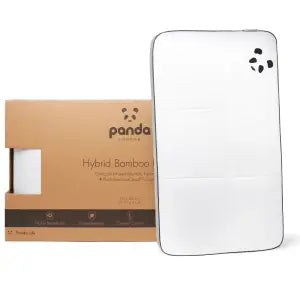 Hybrid Bamboo Pillow
Hybrid Bamboo Pillow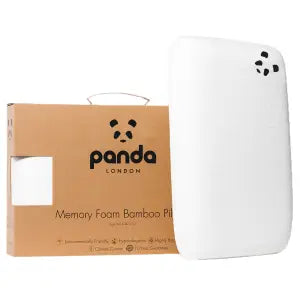 Memory Foam Bamboo Pillow
Memory Foam Bamboo Pillow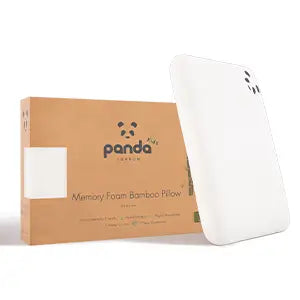 Kids Memory Foam Bamboo Pillow
Kids Memory Foam Bamboo Pillow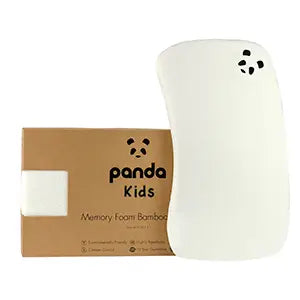 Baby Memory Foam Bamboo Pillow
Baby Memory Foam Bamboo Pillow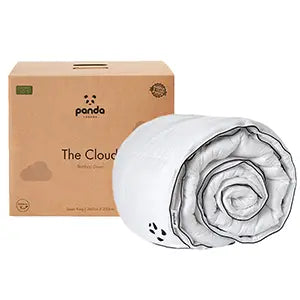 Panda Cloud Duvet
Panda Cloud Duvet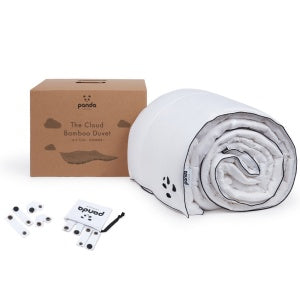 Bamboo Summer Duvet
Bamboo Summer Duvet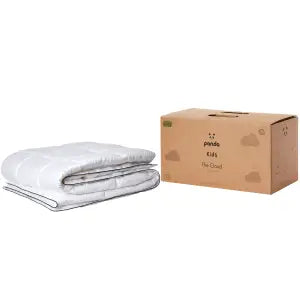 Kids Cloud Duvet
Kids Cloud Duvet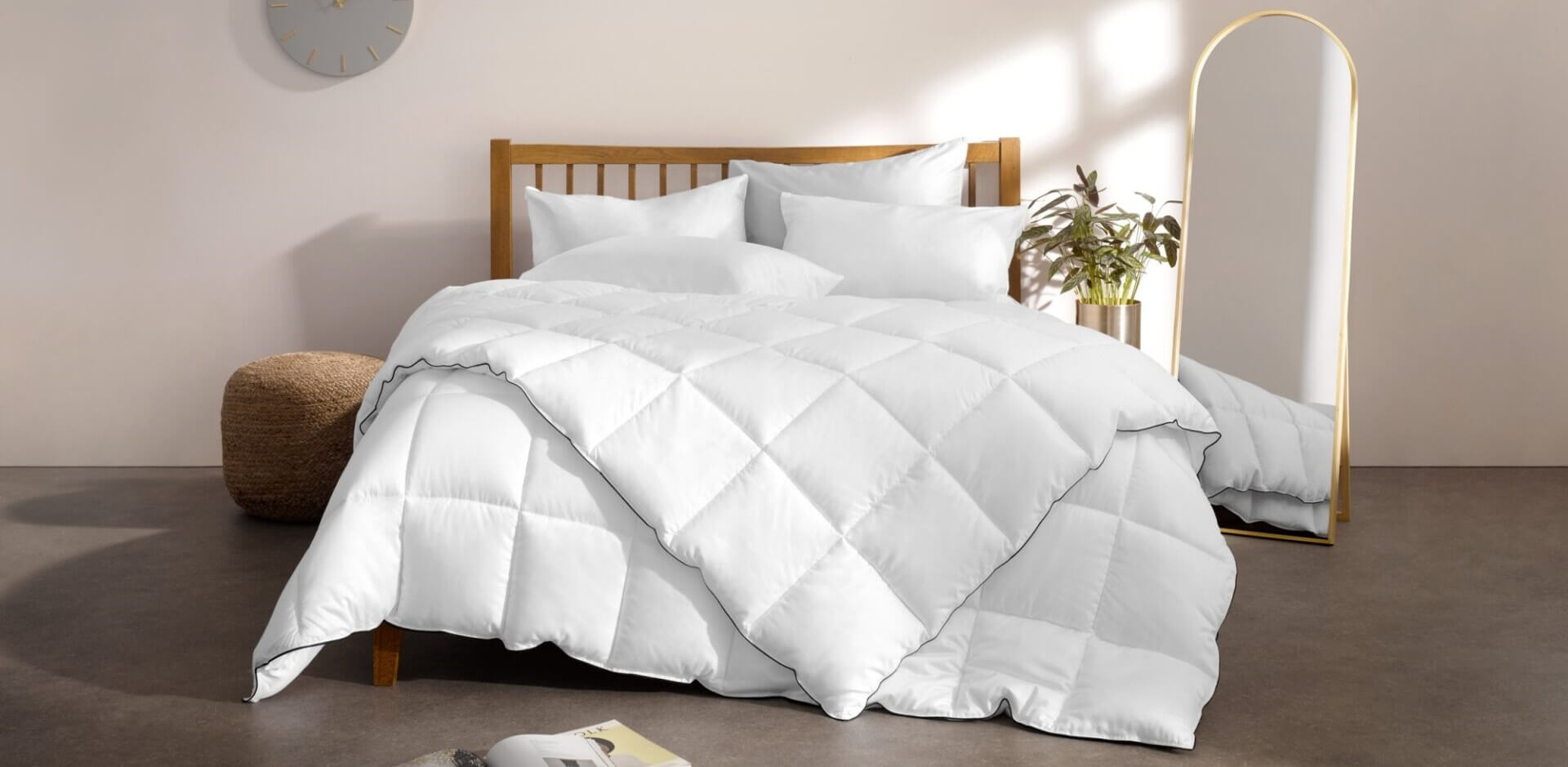

![[GreyEyeMask] Panda London Bamboo Grey Eye Mask](http://pandalondon.com/cdn/shop/files/Grey_Eye_Mask_01.jpg?v=1718269260&width=1000)
![[GreyEyeMask] Panda London Bamboo Grey Eye Mask Full](http://pandalondon.com/cdn/shop/files/Grey_Eye_Mask_02.jpg?v=1718269260&width=1000)
![[GreyEyeMask] Panda London Bamboo Grey Eye Mask Package](http://pandalondon.com/cdn/shop/files/Grey_Eye_Mask_03.jpg?v=1718269259&width=1000)
![[BlackEyeMask] Panda London Bamboo Black Eye Mask Package](http://pandalondon.com/cdn/shop/files/Black_Eye_Mask_01.jpg?v=1718269260&width=870)
![[BlackEyeMask] Panda London Bamboo Black Eye Mask Full](http://pandalondon.com/cdn/shop/files/Black_Eye_Mask_02.jpg?v=1718269259&width=1000)
![[BlackEyeMask] Panda London Bamboo Black Eye Mask Full Package](http://pandalondon.com/cdn/shop/files/Black_Eye_Mask_03.jpg?v=1718269259&width=1000)
![[VintagePink] Pink_Eye_Mask_01](http://pandalondon.com/cdn/shop/files/Pink_Eye_Mask_01.jpg?v=1718269259&width=909)
![[VintagePink] vintage-pink Panda London Bamboo Eye mask](http://pandalondon.com/cdn/shop/files/Pink_Eye_Mask_02.jpg?v=1718269260&width=1000)
![[VintagePink] vintage-pink Panda London Bamboo Eye mask Package Full](http://pandalondon.com/cdn/shop/files/Pink_Eye_Mask_03.jpg?v=1718269259&width=1000)
![[KidsDuvet] Kids Cloud Duvet product image](http://pandalondon.com/cdn/shop/products/Panda-London_Kids_Duvet-scaled.jpg?v=1713363289&width=1920)
![[KidsDuvet] Kids Cloud Duvet on a cotbed](http://pandalondon.com/cdn/shop/files/Kids-KidsCloudDuvet.jpg?v=1750342405&width=2000)
![[KidsDuvet] Kids Cloud Bamboo Duvet Folded](http://pandalondon.com/cdn/shop/files/Kids_Cloud_Bamboo_Duvet_-_Folded_-_Logo_Shown_-_White_Background_Kids_Duvet.jpg?v=1750342405&width=1000)
![[KidsDuvet] Kids_CloudBambooDuvet-CornerLip-WhiteBackground](http://pandalondon.com/cdn/shop/files/Kids_CloudBambooDuvet-CornerLip-WhiteBackground.jpg?v=1750342405&width=2000)
![[KidsDuvet] Kids_Cloud_Bamboo_Duvet_-_Padded_-_Close_Up_Shot_Kids](http://pandalondon.com/cdn/shop/files/Kids_Cloud_Bamboo_Duvet_-_Padded_-_Close_Up_Shot_Kids.jpg?v=1750342405&width=1000)
![[KidsDuvet] Kids_CloudBambooDuvetRolled-WhiteBackground_1](http://pandalondon.com/cdn/shop/files/Kids_CloudBambooDuvetRolled-WhiteBackground_1.jpg?crop=region&crop_height=1697&crop_left=151&crop_top=0&crop_width=1697&v=1750342405&width=2000)
![[KidsDuvetUKSingle] UK_Single_kids_-_Summer_Cloud_Duvet_Main_Image](http://pandalondon.com/cdn/shop/files/UK_Single_kids_-_Summer_Cloud_Duvet_Main_Image.webp?v=1750342648&width=1000)
![[KidsDuvetUKSingle] UK_Single_Kids-Image_Summer_Bamboo_Duvet_Lifestyle_image-1](http://pandalondon.com/cdn/shop/files/UK_Single_Kids-Image_Summer_Bamboo_Duvet_Lifestyle_image-1.webp?v=1750342794&width=1000)
![[KidsDuvetUKSingle]UK_Single_Summer_Duvet_-_Duvet_Folded_Isolated-webp](http://pandalondon.com/cdn/shop/files/UK_Single_Summer_Duvet_-_Duvet_Folded_Isolated-webp.webp?v=1750342794&width=1000)
![[KidsDuvetUKSingle] UK_Single_Summer_Duvet_-_Snuggle_Snaps_Bag_02-webp](http://pandalondon.com/cdn/shop/files/UK_Single_Summer_Duvet_-_Snuggle_Snaps_Bag_02-webp.webp?v=1750343051&width=1000)
![[KidsDuvetUKSingle] UK_Single_Kids_-_Summer_Cloud_Snuggle_Snaps_Image_Webp](http://pandalondon.com/cdn/shop/files/UK_Single_Kids_-_Summer_Cloud_Snuggle_Snaps_Image_Webp.webp?v=1764079307&width=1500)
![[KidsDuvetAllSeason] Kids Duvet UK Single 10.5 tog rating all season one](http://pandalondon.com/cdn/shop/files/Kids_All_Seasn_10.5_Tog_Panda_Cloud_Duvet_Main_Image.jpg?v=1750685858&width=1920)
![[KidsDuvetAllSeason] Texture Duvet Cloud Panda](http://pandalondon.com/cdn/shop/files/Kids_All_Season_Panda_Cloud_Bamboo_Duvet_-_Padded_-_Close_Up_Shot.jpg?crop=region&crop_height=1900&crop_left=169&crop_top=0&crop_width=1900&v=1750686755&width=2239)
![[KidsDuvetAllSeason] Rolled Duvet All Season 10.5 tog](http://pandalondon.com/cdn/shop/files/Kids_All_Season_Duvet_Image_002_Panda_Cloud_Duvet.jpg?v=1750686755&width=1000)
![[KidsDuvetAllSeason] Panda Cloud Duvet Corner](http://pandalondon.com/cdn/shop/files/Kids_All_Season_Panda_Cloud_Cloud_Bamboo_Duvet_-_Corner_Lip_-_White_Background.jpg?v=1750686755&width=4848)
![[KidsDuvetAllSeason] All season Panda Cloud Duvet](http://pandalondon.com/cdn/shop/files/Kids_All_Season_Duvet_UK_Single_Kids-Image_Summer_Bamboo_Duvet_Lifestyle_image-1_webp.jpg?v=1750686755&width=1000)
![[PureWhiteDC] White Duvet Cover 100% Bamboo Bedding buttons](http://pandalondon.com/cdn/shop/files/ButtonsDuvetCoverPureWhite.jpg?v=1714123697&width=2000)
![[PureWhiteDC] White Duvet Cover 100% Bamboo Bedding Package](http://pandalondon.com/cdn/shop/files/White_Duvet_Cover_Bamboo_Bedding_Package.webp?v=1721052312&width=1811)
![[PureWhiteDC] White Duvet Cover 100% Bamboo Bedding Stripes](http://pandalondon.com/cdn/shop/files/White_Duvet_Cover_Straps_100_Bamboo_Bedding.webp?v=1721052311&width=1000)
![[PureWhiteDC] White Duvet Cover 100% Bamboo Bedding Texture](http://pandalondon.com/cdn/shop/files/White_Duvet_Cover_100_Bamboo_Bedding_-_Pure_White_-_Duvet_Cover_Texture.webp?v=1721052312&width=1000)
![[PureWhiteDC] White Duvet Cover 100% Bamboo Bedding Woman buttons hands](http://pandalondon.com/cdn/shop/files/White_Duvet_Cover_-_Woman_hands_and_buttons.webp?v=1721052312&width=1000)
![[VintagePinkDC] Vintage Pink Duvet Cover 100% Bamboo Bedding buttons](http://pandalondon.com/cdn/shop/files/Vintage_Pink_Duvet_Cover_Bamboo_Bedding_Buttons.webp?v=1743769041&width=1000)
![[VintagePinkDC] Vintage Pink Duvet Cover 100% Bamboo Bedding package](http://pandalondon.com/cdn/shop/files/Vintage_Pink_Duvet_Cover_Package_Bamboo_Bedding.webp?v=1743769041&width=1811)
![[VintagePinkDC] Vintage Pink Duvet Cover 100% Bamboo Bedding Stripes](http://pandalondon.com/cdn/shop/files/Vintage_Pink_Duvet_Cover_Bamboo_Bedding_Stripes.jpg?v=1721052469&width=1000)
![[VintagePinkDC] Vintage Pink Duvet Cover 100% Bamboo Bedding Texture](http://pandalondon.com/cdn/shop/files/Vintage_Pink_Duvet_Cover_Bamboo_Bedding_Texture.webp?v=1743769041&width=1000)
![[VintagePinkDC] Vintage Pink Duvet Cover 100% Bamboo Bedding Woman In Bed Sitting](http://pandalondon.com/cdn/shop/files/Vintage_Pink_Duvet_Cover_Bamboo_Bedding_Woman_in_bed.webp?v=1721052470&width=1000)
![[NavyDC] Deep Sea Navy Duvet Cover 100% Bamboo Bedding Buttons](http://pandalondon.com/cdn/shop/files/Deep_Sea_Navy_Buttons_Duvet_Cover_Bamboo_Bedding.webp?v=1744115105&width=1000)
![[NavyDC] Deep Sea Navy Duvet Cover 100% Bamboo Bedding Package](http://pandalondon.com/cdn/shop/files/Deep_Sea_Navy_Package_Duvet_Cover_Bamboo_Bedding.webp?v=1744115105&width=1811)
![[NavyDC] Deep Sea Navy Duvet Cover 100% Bamboo Bedding Stripes](http://pandalondon.com/cdn/shop/files/Deep_Sea_Navy_Stripes_Duvet_Cover_Bamboo_Bedding.webp?v=1721053122&width=1000)
![[NavyDC] Deep Sea Navy Duvet Cover 100% Bamboo Bedding Texture](http://pandalondon.com/cdn/shop/files/Deep_Sea_Navy_Texture_Duvet_Cover_Bamboo_Bedding.webp?v=1744115105&width=1000)
![[NavyDC] Deep Sea Navy Duvet Cover 100% Bamboo Bedding Woman in bed sitting](http://pandalondon.com/cdn/shop/files/Deep_Sea_Navy_Woman_in_bed_Duvet_Cover_Bamboo_Bedding.webp?v=1721053123&width=1000)
![[GreyDC] Quiet Grey Duvet Cover 100% Bamboo Bedding Buttons](http://pandalondon.com/cdn/shop/files/Quiet_Grey_Cloud_Duvet_Cover_Bamboo_Bedding_Buttons.webp?v=1721053361&width=1000)
![[GreyDC] Quiet Grey Duvet Cover 100% Bamboo Bedding Package](http://pandalondon.com/cdn/shop/files/Quiet_Grey_Package_Duvet_Cover_Bamboo_Bedding_Buttons.webp?v=1721053360&width=1811)
![[GreyDC] Quiet Grey Duvet Cover 100% Bamboo Bedding Stripes](http://pandalondon.com/cdn/shop/files/Quiet_Grey_Stripes_Duvet_Cover_Bamboo_Bedding_Buttons.webp?v=1721053360&width=1000)
![[GreyDC] Quiet Grey Duvet Cover 100% Bamboo Bedding Texture](http://pandalondon.com/cdn/shop/files/Quiet_Grey_Texture_Duvet_Cover_Bamboo_Bedding_Buttons.webp?v=1721053361&width=1000)
![[GreyDC] Quiet Grey Duvet Cover 100% Bamboo Bedding Woman sitting in bed smiling](http://pandalondon.com/cdn/shop/files/Quiet_Grey_woman_in_bed_Duvet_Cover_Bamboo_Bedding_Buttons.webp?v=1721053361&width=1000)
![[UrbanGreyDC] Urban Grey Duvet Cover 100% Bamboo Bedding Buttons Woman hand](http://pandalondon.com/cdn/shop/files/Urban_Grey_Duvet_Grey_Bamboo_Bedding_buttons.webp?v=1721053513&width=1000)
![[UrbanGreyDC] Urban Grey Duvet Cover 100% Bamboo Bedding Buttons Package](http://pandalondon.com/cdn/shop/files/Duvet_Cover_Urban_Grey_Package_Bamboo_Bedding.webp?v=1721053512&width=1811)
![[UrbanGreyDC] Urban Grey Duvet Cover 100% Bamboo Bedding Stripes](http://pandalondon.com/cdn/shop/files/Urban_Grey_Duvet_Grey_Bamboo_Bedding_Stripes.webp?v=1721053512&width=1000)
![[UrbanGreyDC] Urban Grey Duvet Cover 100% Bamboo Bedding Buttons Texture](http://pandalondon.com/cdn/shop/files/Urban_Grey_Duvet_Grey_Bamboo_Bedding_Texture.webp?v=1721053513&width=1000)
![[UrbanGreyDC] Urban Grey Duvet Cover 100% Bamboo Bedding Buttons Woman sitting in bed smiling](http://pandalondon.com/cdn/shop/files/Urban_Grey_Duvet_Grey_Bamboo_Bedding_Woman_in_bed.webp?v=1721053513&width=1000)
